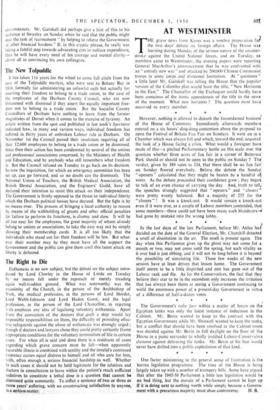AT WESTMINSTER T HE grave news from Korea was a sombre
preparation for' the two days' debate on foreign affairs. The House was learning during Monday of the serious nature of the counter- stroke against the United Nations' forces, and on Tuesday, as members came to Westminster, the evening papers were reporting General MacArthur's announcement that he was confronted with an " entirely new war " and attacked by 200,000 Chinese Communist troops in army corps and divisional formation. At " questions " a little later Mr. Gaitskell was telling the House that the popular version of the Colombo plan would have the title, " New Horizons in the East." The Chancellor of the Exchequer could hardly have been conscious of the ironic appositeness of the title to the news of the moment. What new horizons ? The question must have occurred to every member.
* * * *
However, nothing is allowed to disturb the foreordained businessl of the House of Commons. Immediately afterwards members entered on a six hours' ding-dong contention about the proposal to open the Festival of Britain Fun Fair on Sundays. It went on in a Chamber which was always full and which, toward.the end, acquired the look of a House facing a crisis. What would a foreigner have made of this—a pitched Parliamentary battle on this scale over the question whether three acres of fun fair in a corner of Battersea' Park should or should not be open to the public on Sunday ? Thel verdict, given by 389 votes to 134, that there shall be no fun fair! on Sunday floored everybody. Before the debate the Sunday; " openers " calculated that they might be beaten by a handful o01 votes. As the debate proceeded their confidence grew ; they began to talk of an even chance of carrying the day. And, truth to tell, the speeches strongly suggested that " openers " and " closers " were pretty evenly balanced. But a- majority of 255 for the " closers ",! It was a knock-out. It would remain a knock-out even if it were true, as a couple of Labour members contended,.thall some members—there could not have been many such blunderers-4 had gone by mistake into the wrong lobby.
* * * .* ii
In the last days of the late Parliament, before- Mr. Attlee had
decided on the date of the General Election, Mr. Churchill detected a smell of dissolution in the air. The smell is present again. The day when this Parliament gives up the ghost may not come for a month or two, may not come until the spring, but such vitality as it ever had is just ebbing, and it will not be long before it is beyond the possibility of simulating life. These few weeks of the new session have at least driven that lesson home. The Government itself seems to be ..a little dispirited and zest has gone out of the Labour rank and file. As for the Conservatives, the fact that they believe their star to be in the ascendant only increases the irritation that has always been theirs at seeing a Government continuing to wield the enormous power of a present-day Government in virtue of a difference of half-a-dozen votes.
* * * *
The Government's voile face within a matter of hours on the Egyptian tanks was only the latest instance of indecision in the Cabinet. Mr. Bevin wanted to keep to the contract with the Egyptian Government while Mr. Shinwell wanted to keep the tanks, but a conflict that should have been resolved in the Cabinet room
was decided against Mr. Bevin in full daylight on the floor of the House in a panic surrender to wholly justified Labour-Conservative clamour against delivering the tanks. Mr. Bevin at his best would never have drifted into a public capitulation of that kind.
* * * *
One factor ministering to the general sense of frustration is the barren legislative programme. The time of the House is being largely taken up with a number of trumpery bills. Some have argued that after the 1945-50 Parliament a little less legislation would be no bad thing, but the morale of a Parliament cannot be kept up if it is doing next to nothing worth while simply because a Govern-
ment with a: precariousmajority must, shun controversy. H. B, .






































 Previous page
Previous page